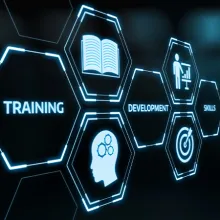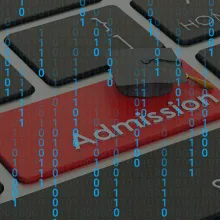Curriculum
BECOME AN INTELLIGENCE PROFESSIONAL
The University of Arizona delivers highly technical Intelligence & Information Operations content through its world class Virtual Learning Environment to ensure our students gain the hands-on knowledge, skills, and abilities necessary to excel in the Intelligence field.
The Intelligence and Information Operations Bachelor of Applied Science (BAS) degree is an advanced upper division Junior/Senior level program.
Students begin classes in the program once they have completed their preparatory Freshman/Sophomore lower division coursework. Lower division pathways exist for Arizona Online, numerous community colleges, as well as other academic and military institutions. We will help you define the courses you need whether you are a Freshman/Sophomore or ready to start your Intelligence and Information Operations BAS degree. Find out what sets our program apart.

Curriculum Delivery
Arizona offers the Intelligence and Information Operations BAS degree in Face-to-Face, Hybrid, and Fully Online formats. We have carefully crafted our courses to ensure that students receive the exact same learning experience regardless of which learning modality they choose. Every Intelligence & Information Operations course provides live-synchronous lectures and hands-on exercise, utilizing relevant and up to date course materials. All online lectures are recorded and made available for students whose schedules do not allow them to attend the synchronous class meetings. Moreover, our Arizona Intelligence & Information Operations faculty are available to support student learning through both scheduled office hours and online live support.
Hands-On Learning
UArizona Intelligence & Information Operations courses are structured to maximize the ability to learn by doing. Intelligence is a highly technical field that requires hands-on experience to master the material. Arizona Intelligence and Information Operations courses maximize the opportunity for students to gain the hands-on experience they will need to be successful intel professionals. Students not only have to learn the concepts and technologies, they must demonstrate they have mastered the course content through hands-on exercises and interactive assessments.

OPERATIONAL INTELLIGENCE TRACK
The Operational Intelligence track is a defense focused intelligence collection, synchronization, and analysis program that prepares graduates for immediate employment within the Intelligence Community. The Operational Intelligence track meets all of the Defense Intelligence Agency (DIA) Intelligence Community - Center of Academic Excellence (IC-CAE) academic requirements.
INFORMATION WARFARE TRACK
The Information Warfare track is focused on both offensive and defensive Information Operations. This track provides graduates with the skills necessary to detect, protect, and craft advanced information operation campaigns. The Operational Intelligence track meets all of the Defense Intelligence Agency (DIA) Intelligence Community - Center of Academic Excellence (IC-CAE) academic requirements.
LAW ENFORCEMENT INTELLIGENCE TRACK
The Law Enforcement Intelligence track is focused on Intelligence driven policing, forensic analysis, and information sharing. The Law Enforcement Intelligence track conforms to major Federal, State, and Local law enforcement agency academic requirements while also meeting the Defense Intelligence Agency (DIA) Intelligence Community - Center of Academic Excellence (IC-CAE) academic requirements.
SIGNALS INTELLIGENCE AND ELECTRONIC WARFARE TRACK
The Signals Intelligence and Electronic Warfare (SIGINT – EW) track is focused on network analysis, wireless networking, Radio Frequency (RF) analysis, and digital signal processing to provide a comprehensive understanding of both RF and protocol fundamentals.
Courses
BASV 314 MATHEMATICS FOR APPLIED SCIENCES
BASV 314 will examine applications of probability, statistics, data analysis, hypothesis testing, apportionment and scheduling to the applied sciences. Registration requires a passing grade on the UA South BAS Math Readiness test.
CYBV329 CYBER LAW, ETHICS, AND POLICY
CYBV329 consists of a sustained study of ethical and legal issues that arise in relation to employment in the public and private sectors, including allocation of resources, corporate and social responsibility, relationships, and discrimination. A main focus of this course will be on the ethical and legal standards governing information technology. New technology creates ethical challenges for individuals around the globe, and applies to most persons regardless of whether they are employed in the information technology field or a more...
CYBV351 SIGNALS INTELLIGENCE & ELECTRONIC WARFARE
CYBV 351 is an elective course that will provide students an in-depth look at Signals Intelligence (SIGINT) and Electronic Warfare (EW) from a strategic, operational, tactical, and technological aspect, including the role of electromagnetic energy in SIGINT and EW operations. Students will use a combination of assessments, research, and practical exercise to gain a holistic view of SIGINT and EW applications in the National Intelligence Enterprise.
CYBV354 PRINCIPLES OF OPEN SOURCE INTELLIGENCE
CYBV354 will provide students with an overview of the fundamentals of Open Source Intelligence. Students will be presented with the most effective methodologies used by cyber professionals, law enforcement, and other investigative personnel to locate and analyze information on the Internet and Dark Web. Students will use interactive exercises to become familiar with the volume of sensitive data on the Internet and how it can be exploited to develop highly detailed intelligence products.
CYBV436 COUNTER CYBER THREAT INTELLIGENCE
CYBV 436 will provide students with an in-depth examination of the tactics, techniques and procedures used to conduct online anonymization and attribution. An extensive analysis of the concepts, technologies, and best practices will be presented. Students will use interactive activities to become familiar with and practice the protection...
CYBV437 DECEPTION, COUNTER-DECEPTION & COUNTER-INTELLIGENCE
CYBV437 provides students with an introduction to the concepts of deception, counter-deception, counterintelligence, and psychological operations. A survey of how these concepts are used in adversarial Information Operations and why they are among the most effective mechanisms to sway public opinion will be presented. Students will use interactive exercises to become familiar with how to detect deception campaigns as well as the mitigation strategies to defend against them.
CYBV450 INFORMATION WARFARE
CYBV450 provides students with an in-depth overview of the tactics, techniques, procedures, and tools used to conduct and defend against Information Operation campaigns. Students will analyze case studies on online influence efforts in order to be able to detect, deconstruct, and counter adversarial Information Operation campaigns.
CYBV473 VIOLENT PYTHON
CYBV 473 will provide students with advanced practical applications of Python programming to support offensive and defensive cybersecurity operations. A crosscut of Python concepts, tools, and techniques will be presented. Students will use interactive programming activities to master and create advanced Python tools to...
CYBV474 ADVANCED ANALYTICS FOR SECURITY OPERATIONS
CYBV474 provides students an in-depth examination of how the Python scripting language can be used to support advanced analysis in offensive and defensive security operations. Students will use hands-on scripting exercises to evaluate the strengths and weaknesses of automated tools to solve complex security-related problems; practice creating and using Python-based algorithmic solutions; and gain a technical understanding on how to apply the existing Python libraries to support common security-related tasks.
ENGV306 ADVANCED COMPOSITION
ENGV306 studies genre and rhetorical situation; advanced practice in expository writing.
INTV301 AMERICAN POLITICAL IDEAS
INTV301 examines American political ideas from colonial times to the present.
INTV305 INTRODUCTION TO INTELLIGENCE & INFORMATION OPERATIONS
INTV305 provides a broad overview of the American intelligence systems – collection, analysis, counterintelligence, and covert operations – and demonstrate how these systems work together to provide a “decision advantage” for policy makers. Students will also learn how US adversaries have shifted away from directly challenging American forces and have moved to a less risky hybrid warfare model to achieve their tactical and strategic goals. Students will use a combination of research and critical thinking exercises to gain an understanding...
INTV314 NATIONAL SECURITY POLICY
INTV314 studies decision-making structures, processes, and outcomes relevant to American security policy; comparison with major foreign powers.
INTV326 INTRODUCTORY METHODS OF INTELLIGENCE ANALYSIS
INTV326 provides students with an introduction to Intelligence Analysis and how intelligence professionals can incorporate tradecraft, including critical thinking and structured analytical techniques, to challenge judgements, identify mental mindsets, stimulate creativity, and manage uncertainty within the framework of providing sound assessments to decision-makers. Students will leverage scenario-based exercises to practice employing structured analytical techniques in order to answer a decision maker’s critical information requirements.
INTV350 COLLECTION OPERATIONS
INTV350 provide an in-depth examination of how to optimize the coordination of all available collection capabilities in order to support intelligence operations and the military decision making process. Students will conduct research and engage in practical exercises to determine optimal sensor deployment schemes and sensor-to-target mix in order to address different collection requirements.
INTV353 GEOSPATIAL INTELLIGENCE (GEOINT)
INTV 353 will provide students an introduction to GEOINT operations, and how intelligence professionals can incorporate tradecraft and technology to present visual depictions of critical information regarding enemy forces, terrain, and provide combat operations support to decision makers and operations planners. This course studies the electromagnetic spectrum and fundamentals of energy propagation as they pertain to GEOINT systems and phenomenology.
INTV427 INTELLIGENCE SUPPORT TO TARGETING
provide students an in-depth look at the role and practice of Intelligence in the United States Joint Targeting Cycle. This course builds on fundamental knowledge from previous courses, to include the concepts and methodologies used for Joint Intelligence Preparation of the Operational Environment (JIPOE) and Intelligence Preparation of the Battlefield. Additionally, this course will provide students insights into targeting state and non-state actors in competition and conflict, and integrating Intelligence into lethal and non-lethal strategies to create effects against competing or threat actors.
INTV442 INTERNATIONAL LAW
INTV442 studies the international state system; legal-political problems, including territory, environment, seas.
INTV455 TARGET CENTRIC ANALYSIS
INTV455 provides students with an in-depth analysis of the intelligence process; methodologies for evaluating data; threat modeling; and a process to evaluate of the needs of the Intelligence consumer. Students will utilize practical analysis exercises to become familiar with threat modeling, the estimative process, and Intelligence reporting techniques in order to answer a decision maker’s critical information requirements.
INTV459 INTELLIGENCE, SURVEILLANCE & RECONNAISSANCE SYNCHRONIZATION
INTV459 provides an in-depth examination of how to optimize the coordination of all available collection capabilities in order to support intelligence operations and the military decision making process. Students will conduct research and engage in practical exercises to determine optimal sensor deployment schemes and sensor-to-target mix in order to address different collection requirements.
INTV461 CIVIL LIBERTIES AND THE U.S. CONSTITUTION
INTV461 analyzes the constitutional guarantees of civil liberties in the U.S. Constitution
INTV471 NATIONAL SECURITY & INTELLIGENCE
INTV471 covers at a high-level the role of intelligence in the formulation and execution of US national security policy. Will include a detailed look at challenges facing both the analysis of intelligence information and the introduction of that analysis into the national security policy process. Will also entail close reading and discussion of selected declassified intelligence documents.
INTV473 NATIONAL SECURITY OPERATIONS & ISSUES
INTV473 is intended to familiarize students with the basic purposes and nature of US covert action and to help them understand its historical development. More fundamentally, the course will seek to illustrate both covert actions' potential utility and its inherent limitations and challenges; challenges that in some respects have intensified with the rise of non-state actors, the information revolution, and other aspects of the post-Cold War environment. Finally, the course will draw implications for the role of covert action against current national security challenges, especially global terror networks.
INTV474 POLITICS OF TERRORISM
INTV474 provides an introduction to theories of international relations as applied to the study of terrorism, including an examination of major discourses on the conduct of state systems, the foundations of modern terrorism and associated evolution of ideology, tactics, and strategies; and evaluation of terrorist ideologies and how that evaluation can develop a framework for critical analysis.
INTV493 INTERNSHIP IN INTELLIGENCE & INFORMATION OPERATIONS
INTV493 provides students with opportunities for specialized work on an individual basis, consisting of training and practice in actual service in a technical, business, or governmental establishment
INTV496 SPECIAL TOPICS IN INTELLIGENCE & INFORMATION OPERATIONS
The course content and scope of work will vary depending on the selected special topic. Because the issues within the fields of operational intelligence, law enforcement intelligence, and information warfare move at such a fast pace, this course will examine timely and relevant topics that impact support to federal, state, and local decision makers. Students will be expected to participate in frequent activities based on weekly readings and lectures; writing assignments and practical exercises; knowledge and performance based assessments, and other activities as assigned.
INTV498 SENIOR CAPSTONE
INTV498 is a culminating experience for majors involving a substantive project that includes an engagement experience and demonstrates a synthesis of learning accumulated in the major, including broadly comprehensive knowledge of the discipline and its methodologies.
RNR335 INTRODUCTION TO GEOSPATIAL CONCEPTS AND DEFENSE APPLICATIONS
RNR335 provides students with a basic introduction to geospatial technology and concepts with an emphasis on its use in defense and security. The course will be highly participatory involving hands-on practical experience using geospatial technology. Students will be introduced to the concepts of geospatial technology with a focus on applications that are relevant to military officers and others interested in defense and security
BASV 314 MATHEMATICS FOR APPLIED SCIENCES
BASV 314 will examine applications of probability, statistics, data analysis, hypothesis testing, apportionment and scheduling to the applied sciences. Registration requires a passing grade on the UA South BAS Math Readiness test.
CYBV329 CYBER LAW, ETHICS, AND POLICY
CYBV329 consists of a sustained study of ethical and legal issues that arise in relation to employment in the public and private sectors, including allocation of resources, corporate and social responsibility, relationships, and discrimination. A main focus of this course will be on the ethical and legal standards governing information technology. New technology creates ethical challenges for individuals around the globe, and applies to most persons regardless of whether they are employed in the information technology field or a more...
CYBV351 SIGNALS INTELLIGENCE & ELECTRONIC WARFARE
CYBV 351 is an elective course that will provide students an in-depth look at Signals Intelligence (SIGINT) and Electronic Warfare (EW) from a strategic, operational, tactical, and technological aspect, including the role of electromagnetic energy in SIGINT and EW operations. Students will use a combination of assessments, research, and practical exercise to gain a holistic view of SIGINT and EW applications in the National Intelligence Enterprise.
CYBV354 PRINCIPLES OF OPEN SOURCE INTELLIGENCE
CYBV354 will provide students with an overview of the fundamentals of Open Source Intelligence. Students will be presented with the most effective methodologies used by cyber professionals, law enforcement, and other investigative personnel to locate and analyze information on the Internet and Dark Web. Students will use interactive exercises to become familiar with the volume of sensitive data on the Internet and how it can be exploited to develop highly detailed intelligence products.
CYBV436 COUNTER CYBER THREAT INTELLIGENCE
CYBV 436 will provide students with an in-depth examination of the tactics, techniques and procedures used to conduct online anonymization and attribution. An extensive analysis of the concepts, technologies, and best practices will be presented. Students will use interactive activities to become familiar with and practice the protection...
CYBV437 DECEPTION, COUNTER-DECEPTION & COUNTER-INTELLIGENCE
CYBV437 provides students with an introduction to the concepts of deception, counter-deception, counterintelligence, and psychological operations. A survey of how these concepts are used in adversarial Information Operations and why they are among the most effective mechanisms to sway public opinion will be presented. Students will use interactive exercises to become familiar with how to detect deception campaigns as well as the mitigation strategies to defend against them.
CYBV440 DIGITAL ESPIONAGE
CYBV440 will provide students with a comprehensive overview of the concepts, tactics, techniques adversaries use to steal secrets for political or economic reasons. Students will analyze case studies to become familiar with how to detect, identify, and mitigate digital espionage operations and the actors who conduct them.
CYBV441 CYBER WAR, TERROR & CRIME
This course prepares students to perform analyses of major cyber events to determine contextual relevance and possible threat actor intentions. Using case studies, students will conduct an analytic examination of the similarities and differences among discrete cyber events to determine whether an event presents as possible criminal activity, terrorist activity, or rises to the level of an act of war.
CYBV450 INFORMATION WARFARE
CYBV450 provides students with an in-depth overview of the tactics, techniques, procedures, and tools used to conduct and defend against Information Operation campaigns. Students will analyze case studies on online influence efforts in order to be able to detect, deconstruct, and counter adversarial Information Operation campaigns.
CYBV473 VIOLENT PYTHON
CYBV 473 will provide students with advanced practical applications of Python programming to support offensive and defensive cybersecurity operations. A crosscut of Python concepts, tools, and techniques will be presented. Students will use interactive programming activities to master and create advanced Python tools to...
CYBV474 ADVANCED ANALYTICS FOR SECURITY OPERATIONS
CYBV474 provides students an in-depth examination of how the Python scripting language can be used to support advanced analysis in offensive and defensive security operations. Students will use hands-on scripting exercises to evaluate the strengths and weaknesses of automated tools to solve complex security-related problems; practice creating and using Python-based algorithmic solutions; and gain a technical understanding on how to apply the existing Python libraries to support common security-related tasks.
CYBV481 SOCIAL ENGINEERING ATTACKS & DEFENSES
CYBV 481 will provide students with an advanced analysis of the tactics, techniques, and tools used to conduct and defend against Social Engineering attacks. A survey of why social engineering attacks are among the most effective Cyber-attack mechanisms and what can be done to mitigate them will be presented. Students...
ENGV306 ADVANCED COMPOSITION
ENGV306 studies genre and rhetorical situation; advanced practice in expository writing.
INTV301 AMERICAN POLITICAL IDEAS
INTV301 examines American political ideas from colonial times to the present.
INTV305 INTRODUCTION TO INTELLIGENCE & INFORMATION OPERATIONS
INTV305 provides a broad overview of the American intelligence systems – collection, analysis, counterintelligence, and covert operations – and demonstrate how these systems work together to provide a “decision advantage” for policy makers. Students will also learn how US adversaries have shifted away from directly challenging American forces and have moved to a less risky hybrid warfare model to achieve their tactical and strategic goals. Students will use a combination of research and critical thinking exercises to gain an understanding...
INTV314 NATIONAL SECURITY POLICY
INTV314 studies decision-making structures, processes, and outcomes relevant to American security policy; comparison with major foreign powers.
INTV326 INTRODUCTORY METHODS OF INTELLIGENCE ANALYSIS
INTV326 provides students with an introduction to Intelligence Analysis and how intelligence professionals can incorporate tradecraft, including critical thinking and structured analytical techniques, to challenge judgements, identify mental mindsets, stimulate creativity, and manage uncertainty within the framework of providing sound assessments to decision-makers. Students will leverage scenario-based exercises to practice employing structured analytical techniques in order to answer a decision maker’s critical information requirements.
INTV350 COLLECTION OPERATIONS
INTV350 provide an in-depth examination of how to optimize the coordination of all available collection capabilities in order to support intelligence operations and the military decision making process. Students will conduct research and engage in practical exercises to determine optimal sensor deployment schemes and sensor-to-target mix in order to address different collection requirements.
INTV442 INTERNATIONAL LAW
INTV442 studies the international state system; legal-political problems, including territory, environment, seas.
INTV459 INTELLIGENCE, SURVEILLANCE & RECONNAISSANCE SYNCHRONIZATION
INTV459 provides an in-depth examination of how to optimize the coordination of all available collection capabilities in order to support intelligence operations and the military decision making process. Students will conduct research and engage in practical exercises to determine optimal sensor deployment schemes and sensor-to-target mix in order to address different collection requirements.
INTV461 CIVIL LIBERTIES AND THE U.S. CONSTITUTION
INTV461 analyzes the constitutional guarantees of civil liberties in the U.S. Constitution
INTV471 NATIONAL SECURITY & INTELLIGENCE
INTV471 covers at a high-level the role of intelligence in the formulation and execution of US national security policy. Will include a detailed look at challenges facing both the analysis of intelligence information and the introduction of that analysis into the national security policy process. Will also entail close reading and discussion of selected declassified intelligence documents.
INTV473 NATIONAL SECURITY OPERATIONS & ISSUES
INTV473 is intended to familiarize students with the basic purposes and nature of US covert action and to help them understand its historical development. More fundamentally, the course will seek to illustrate both covert actions' potential utility and its inherent limitations and challenges; challenges that in some respects have intensified with the rise of non-state actors, the information revolution, and other aspects of the post-Cold War environment. Finally, the course will draw implications for the role of covert action against current national security challenges, especially global terror networks.
INTV474 POLITICS OF TERRORISM
INTV474 provides an introduction to theories of international relations as applied to the study of terrorism, including an examination of major discourses on the conduct of state systems, the foundations of modern terrorism and associated evolution of ideology, tactics, and strategies; and evaluation of terrorist ideologies and how that evaluation can develop a framework for critical analysis.
INTV493 INTERNSHIP IN INTELLIGENCE & INFORMATION OPERATIONS
INTV493 provides students with opportunities for specialized work on an individual basis, consisting of training and practice in actual service in a technical, business, or governmental establishment
INTV496 SPECIAL TOPICS IN INTELLIGENCE & INFORMATION OPERATIONS
The course content and scope of work will vary depending on the selected special topic. Because the issues within the fields of operational intelligence, law enforcement intelligence, and information warfare move at such a fast pace, this course will examine timely and relevant topics that impact support to federal, state, and local decision makers. Students will be expected to participate in frequent activities based on weekly readings and lectures; writing assignments and practical exercises; knowledge and performance based assessments, and other activities as assigned.
INTV498 SENIOR CAPSTONE
INTV498 is a culminating experience for majors involving a substantive project that includes an engagement experience and demonstrates a synthesis of learning accumulated in the major, including broadly comprehensive knowledge of the discipline and its methodologies.
BASV 314 MATHEMATICS FOR APPLIED SCIENCES
BASV 314 will examine applications of probability, statistics, data analysis, hypothesis testing, apportionment and scheduling to the applied sciences. Registration requires a passing grade on the UA South BAS Math Readiness test.
CYBV301 FUNDAMENTALS OF CYBERSECURITY
CYBV 301 will provide students with an introduction to the fundamentals of cybersecurity, which will include an introduction to cyber security. A broad survey of cybersecurity concepts, tools, technologies and best practices will be presented. Students will use hands-on activities to become familiar with and practice...
CYBV302 LINUX SECURITY ESSENTIALS
provides students with an in-depth analysis of Linux and Unix security issues. This includes configuration guidance using industry standards and benchmarks and implementation through practical, real world examples. The course will examine how to mitigate or eliminate general problems that apply to Nix like OSs, including vulnerabilities in passwords and password authentication systems, virtual memory system, and applications most commonly run.
CYBV303 WINDOWS SECURITY ESSENTIALS
provides students with the foundational knowledge of the Windows Operating System and securing Windows environments including; learning PowerShell scripting, host hardening and active directory scripting, smart tokens and Public Key Infrastructure (PKI), protecting admin credentials, and thwarting hackers inside the network. Students will use hands-on labs and exercises to secure Windows systems, networks, applications, and data.
CYBV326 INTRODUCTORY METHODS OF NETWORK ANALYSIS
CYBV/BASV 326 provides students a methodology for analyzing networks by examining the network at its infrastructure, network and applications layers; exploring how they transfer data; investigating how network protocols work to enable communication; and probing and analyzing how the lower-level network layers support the upper ones...
CYBV329 CYBER LAW, ETHICS, AND POLICY
CYBV329 consists of a sustained study of ethical and legal issues that arise in relation to employment in the public and private sectors, including allocation of resources, corporate and social responsibility, relationships, and discrimination. A main focus of this course will be on the ethical and legal standards governing information technology. New technology creates ethical challenges for individuals around the globe, and applies to most persons regardless of whether they are employed in the information technology field or a more...
CYBV354 PRINCIPLES OF OPEN SOURCE INTELLIGENCE
CYBV354 will provide students with an overview of the fundamentals of Open Source Intelligence. Students will be presented with the most effective methodologies used by cyber professionals, law enforcement, and other investigative personnel to locate and analyze information on the Internet and Dark Web. Students will use interactive exercises to become familiar with the volume of sensitive data on the Internet and how it can be exploited to develop highly detailed intelligence products.
CYBV388 CYBER INVESTIGATIONS AND FORENSICS
CYBV 388 provides students with an understanding of intrusion detection methodologies, tools, and approaches to incident response; examination of computer forensic principles, including operating system concepts, registry structures, file system concepts, boot process, low level hardware calls, and file operations; and an exploration of the ethical...
CYBV435 CYBER THREAT INTELLIGENCE
CYBV435 will provide students with an in-depth investigation of threat actors and the techniques they employ to attack networks. Students will research threat capabilities and objectives. Formal ethical hacking methodology including reconnaissance, scanning and enumeration, gaining access, escalation of privilege, maintaining...
CYBV440 DIGITAL ESPIONAGE
CYBV440 will provide students with a comprehensive overview of the concepts, tactics, techniques adversaries use to steal secrets for political or economic reasons. Students will analyze case studies to become familiar with how to detect, identify, and mitigate digital espionage operations and the actors who conduct them.
CYBV441 CYBER WAR, TERROR & CRIME
This course prepares students to perform analyses of major cyber events to determine contextual relevance and possible threat actor intentions. Using case studies, students will conduct an analytic examination of the similarities and differences among discrete cyber events to determine whether an event presents as possible criminal activity, terrorist activity, or rises to the level of an act of war.
ENGV306 ADVANCED COMPOSITION
ENGV306 studies genre and rhetorical situation; advanced practice in expository writing.
INTV301 AMERICAN POLITICAL IDEAS
INTV301 examines American political ideas from colonial times to the present.
INTV305 INTRODUCTION TO INTELLIGENCE & INFORMATION OPERATIONS
INTV305 provides a broad overview of the American intelligence systems – collection, analysis, counterintelligence, and covert operations – and demonstrate how these systems work together to provide a “decision advantage” for policy makers. Students will also learn how US adversaries have shifted away from directly challenging American forces and have moved to a less risky hybrid warfare model to achieve their tactical and strategic goals. Students will use a combination of research and critical thinking exercises to gain an understanding...
INTV314 NATIONAL SECURITY POLICY
INTV314 studies decision-making structures, processes, and outcomes relevant to American security policy; comparison with major foreign powers.
INTV326 INTRODUCTORY METHODS OF INTELLIGENCE ANALYSIS
INTV326 provides students with an introduction to Intelligence Analysis and how intelligence professionals can incorporate tradecraft, including critical thinking and structured analytical techniques, to challenge judgements, identify mental mindsets, stimulate creativity, and manage uncertainty within the framework of providing sound assessments to decision-makers. Students will leverage scenario-based exercises to practice employing structured analytical techniques in order to answer a decision maker’s critical information requirements.
INTV350 COLLECTION OPERATIONS
INTV350 provide an in-depth examination of how to optimize the coordination of all available collection capabilities in order to support intelligence operations and the military decision making process. Students will conduct research and engage in practical exercises to determine optimal sensor deployment schemes and sensor-to-target mix in order to address different collection requirements.
INTV442 INTERNATIONAL LAW
INTV442 studies the international state system; legal-political problems, including territory, environment, seas.
INTV459 INTELLIGENCE, SURVEILLANCE & RECONNAISSANCE SYNCHRONIZATION
INTV459 provides an in-depth examination of how to optimize the coordination of all available collection capabilities in order to support intelligence operations and the military decision making process. Students will conduct research and engage in practical exercises to determine optimal sensor deployment schemes and sensor-to-target mix in order to address different collection requirements.
INTV461 CIVIL LIBERTIES AND THE U.S. CONSTITUTION
INTV461 analyzes the constitutional guarantees of civil liberties in the U.S. Constitution
INTV471 NATIONAL SECURITY & INTELLIGENCE
INTV471 covers at a high-level the role of intelligence in the formulation and execution of US national security policy. Will include a detailed look at challenges facing both the analysis of intelligence information and the introduction of that analysis into the national security policy process. Will also entail close reading and discussion of selected declassified intelligence documents.
INTV473 NATIONAL SECURITY OPERATIONS & ISSUES
INTV473 is intended to familiarize students with the basic purposes and nature of US covert action and to help them understand its historical development. More fundamentally, the course will seek to illustrate both covert actions' potential utility and its inherent limitations and challenges; challenges that in some respects have intensified with the rise of non-state actors, the information revolution, and other aspects of the post-Cold War environment. Finally, the course will draw implications for the role of covert action against current national security challenges, especially global terror networks.
INTV474 POLITICS OF TERRORISM
INTV474 provides an introduction to theories of international relations as applied to the study of terrorism, including an examination of major discourses on the conduct of state systems, the foundations of modern terrorism and associated evolution of ideology, tactics, and strategies; and evaluation of terrorist ideologies and how that evaluation can develop a framework for critical analysis.
INTV493 INTERNSHIP IN INTELLIGENCE & INFORMATION OPERATIONS
INTV493 provides students with opportunities for specialized work on an individual basis, consisting of training and practice in actual service in a technical, business, or governmental establishment
INTV496 SPECIAL TOPICS IN INTELLIGENCE & INFORMATION OPERATIONS
The course content and scope of work will vary depending on the selected special topic. Because the issues within the fields of operational intelligence, law enforcement intelligence, and information warfare move at such a fast pace, this course will examine timely and relevant topics that impact support to federal, state, and local decision makers. Students will be expected to participate in frequent activities based on weekly readings and lectures; writing assignments and practical exercises; knowledge and performance based assessments, and other activities as assigned.
INTV498 SENIOR CAPSTONE
INTV498 is a culminating experience for majors involving a substantive project that includes an engagement experience and demonstrates a synthesis of learning accumulated in the major, including broadly comprehensive knowledge of the discipline and its methodologies.
NETV477 ADVANCED COMPUTER FORENSICS
This course is an advanced computer forensics course that provides students an in depth knowledge of network forensics, network flow analysis, network intrusion detection systems, event reconstruction and memory forensics for Windows, Linux and MAC operating systems.
BASV 314 MATHEMATICS FOR APPLIED SCIENCES
BASV 314 will examine applications of probability, statistics, data analysis, hypothesis testing, apportionment and scheduling to the applied sciences. Registration requires a passing grade on the UA South BAS Math Readiness test.
CYBV329 CYBER LAW, ETHICS, AND POLICY
CYBV329 consists of a sustained study of ethical and legal issues that arise in relation to employment in the public and private sectors, including allocation of resources, corporate and social responsibility, relationships, and discrimination. A main focus of this course will be on the ethical and legal standards governing information technology. New technology creates ethical challenges for individuals around the globe, and applies to most persons regardless of whether they are employed in the information technology field or a more...
CYBV450 Information Warfare
CYBV 450 will provide students with an in-depth overview of the tactics, techniques, procedures, and tools used to conduct and defend against Information Operation campaigns. Students will analyze case studies on online influence efforts in order to be able to detect, deconstruct, and counter adversarial Information Operation campaigns.
ENGV306 ADVANCED COMPOSITION
ENGV306 studies genre and rhetorical situation; advanced practice in expository writing.
CYBV351 Signals Intelligence and Electronic Warfare
CYBV 351 is an elective course that will provide students an in-depth look at Signals Intelligence (SIGINT) and Electronic Warfare (EW) from a strategic, operational, tactical, and technological aspect, including the role of electromagnetic energy in SIGINT and EW operations. Students will use a combination of assessments, research, and practical exercise to gain a holistic view of SIGINT and EW applications in the National Intelligence Enterprise.
INTV305 INTRODUCTION TO INTELLIGENCE & INFORMATION OPERATIONS
INTV305 provides a broad overview of the American intelligence systems – collection, analysis, counterintelligence, and covert operations – and demonstrate how these systems work together to provide a “decision advantage” for policy makers. Students will also learn how US adversaries have shifted away from directly challenging American forces and have moved to a less risky hybrid warfare model to achieve their tactical and strategic goals. Students will use a combination of research and critical thinking exercises to gain an understanding...
CYBV326 Introductory Methods of Intelligence
INTV326 provides students with an introduction to Intelligence Analysis and how intelligence professionals can incorporate tradecraft, including critical thinking and structured analytical techniques, to challenge judgements, identify mental mindsets, stimulate creativity, and manage uncertainty within the framework of providing sound assessments to decision-makers. Students will leverage scenario-based exercises to practice employing structured analytical techniques in order to answer a decision maker’s critical information requirements.
CYBV350 Intelligence Collective
INTV350 provide an in-depth examination of how to optimize the coordination of all available collection capabilities in order to support intelligence operations and the military decision making process. Students will conduct research and engage in practical exercises to determine optimal sensor deployment schemes and sensor-to-target mix in order to address different collection requirements.
INTV459 Intelligence, Surveillance & Reconnaissance
INTV459 provides an in-depth examination of how to optimize the coordination of all available collection capabilities in order to support intelligence operations and the military decision making process. Students will conduct research and engage in practical exercises to determine optimal sensor deployment schemes and sensor-to-target mix in order to address different collection requirements.
INTV498 Capstone
INTV498 is a culminating experience for majors involving a substantive project that includes an engagement experience and demonstrates a synthesis of learning accumulated in the major, including broadly comprehensive knowledge of the discipline and its methodologies.






